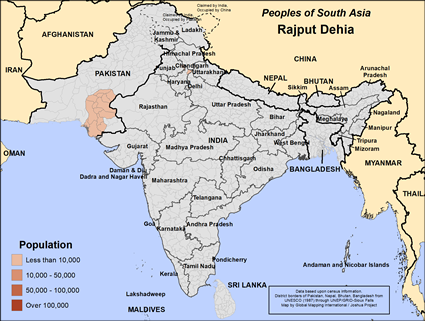Rajput Dehia in India

Send Joshua Project a photo
of this people group. |

Map Source:
People Group data: Omid. Map geography: UNESCO / GMI. Map Design: Joshua Project
|
| People Name: | Rajput Dehia |
| Country: | India |
| 10/40 Window: | Yes |
| Population: | 1,700 |
| World Population: | 27,700 |
| Primary Language: | Urdu |
| Primary Religion: | Islam |
| Christian Adherents: | 0.00 % |
| Evangelicals: | 0.00 % |
| Scripture: | Complete Bible |
| Ministry Resources: | Yes |
| Jesus Film: | Yes |
| Audio Recordings: | Yes |
| People Cluster: | South Asia Muslim - Rajput |
| Affinity Bloc: | South Asian Peoples |
| Progress Level: |
|
Introduction / History
Starting in the 5th century there was a massive attack by the White Huns in what is now northern and northwestern India and Pakistan. About a century later the reigning Hindu-based Gupta Empire broke up, leaving the Subcontinent vulnerable to Muslim invaders from the north. As time went on, invaders took over land and integrated with the settled peoples of this region. Tribal leaders, especially those involved with defense, were accepted as Kshatrya, the second highest varna (major type of castes) in Hindu society, while their followers became the fourth and lowest varna. Priests became the Brahmins, the highest of the four varnas.
The Rajputs, who were part of the Kshatrya varna, became politically important in the seventh century. From around 800 AD Rajput dynasties ruled northern India. Petty Rajput kingdoms were the main obstacle for Muslim domination of the Hindu subcontinent. For more than 500 years Rajputs were the warriors who defended kingdoms from invaders and conquered others. When possible, Rajputs settled down, became nobles, and enjoyed the lives of landed gentry.
Over a period of a couple hundred years, invaders penetrated the Rajput wall that protected the Subcontinent. Some Rajput subgroups converted to Islam during this time. Legend has it that the Muslim community of Rajput is the descendant of Umrao Singh. Umrao had fought against a conquering Muslim ruler over the death of the ruler's son. However, after his release, Umrao was never restored to his Hindu Rajput community and as an outcast, formed his own Muslim Rajput community.
Though most Rajputs are Hindu, there are many Sikh and Muslim communities. One of the Muslim Rajput communities is Dehia.
What Are Their Lives Like?
The Dehia Rajputs are primarily an agricultural community. They have been losing their landholdings, so a growing number have become employed in service and even wage labor jobs. Women earn money through weaving, embroidery and by making handkerchiefs. For women, toe-rings, nose-pins and glass bangles are common symbols for being married. They are non-vegetarian though avoid beef and enjoy foods like wheat, rice and pulses.
What Are Their Beliefs?
Though most Rajputs are Hindu, there are sizable Sikh and Muslim Rajput groups. One of these is within the Dehia subgroup. They are Sunni Muslims but with much influence by Hindu traditions they retain a variety of Hindu practices.
Dehia Rajputs believe that the supreme God, Allah, spoke through his prophet, Mohammed, and taught mankind how to live a righteous life through the Koran and the Hadith. To live a righteous life, you must utter the Shahada (a statement of faith), pray five times a day facing Mecca, fast from sunup to sundown during the month of Ramadan, give alms to the poor, and make a pilgrimage to Mecca if you have the means. Muslims are prohibited from drinking alcohol, eating pork, gambling, stealing, slandering, and making idols. They gather for corporate prayer on Friday afternoons at a mosque, their place of worship.
The two main holidays for Sunni Muslims are Eid al Fitr, the breaking of the monthly fast and Eid al Adha, the celebration of Abraham's willingness to sacrifice his son to Allah.
Sunni religious practices are staid and simple. They believe Allah has pre-determined our fates; they minimize free will.
In most of the Muslim world, common people depend on the spirit world for their daily needs since they regard Allah as too distant. Allah may determine their eternal salvation, but the spirits determine how well they live on a daily basis. For that reason, some Muslims appease spirits using charms and amulets to help them with spiritual forces. More orthodox Muslims consider these practices heretical and un-Islamic.
What Are Their Needs?
No matter where Rajputs live, they need the humility to recognize their need for a Savior. They also need the chance to find this savior. In general, Rajput peoples live in some of India's least reached regions.
Prayer Points
Pray for the Rajput community to increasingly grow in awareness of Jesus and their need for Him.
Pray the Lord will give Rajputs a spiritual hunger, then satisfy that hunger.
Pray that these Rajputs will understand the value of becoming part of God's royal family.
Pray for a Holy Spirit led humility for all Rajput communities to fall at the feet of the King of kings.
Pray for a disciple making movement among every Rajput community in India.